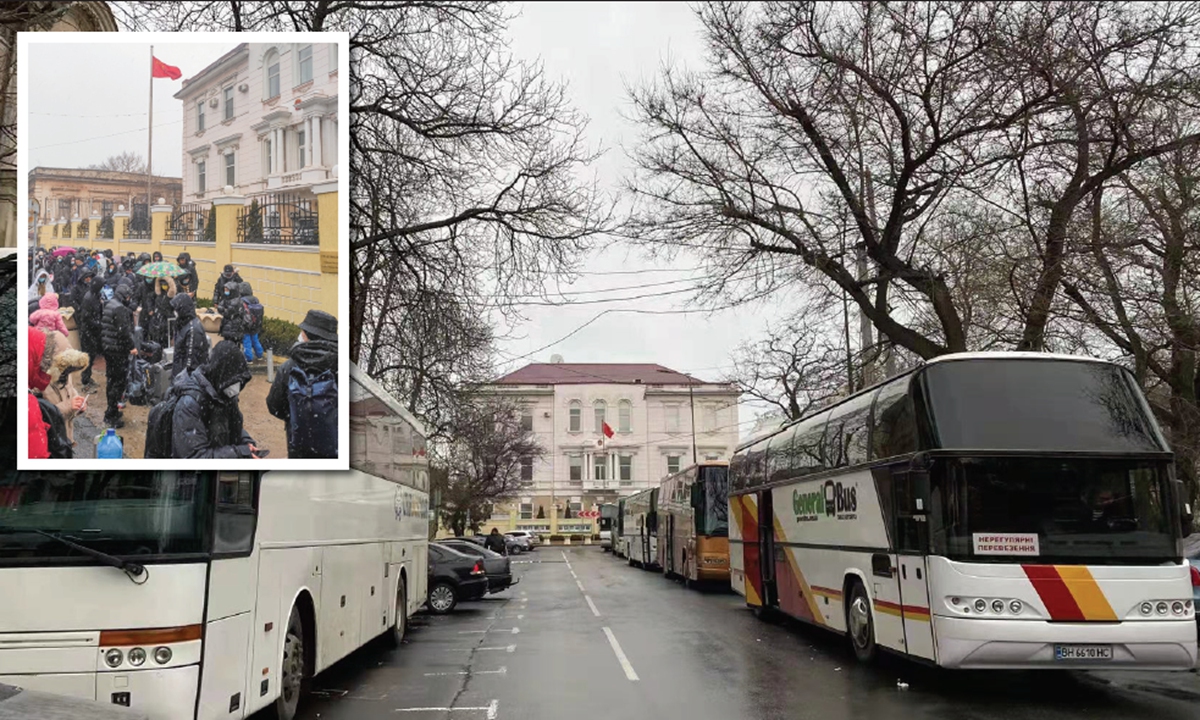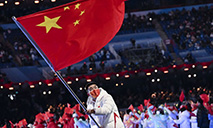China launches one of the largest Chinese citizens evacuations in Ukraine

Buses wait in front of the Chinese Consulate-General in Odessa, Ukraine on March 1 to evacuate Chinese nationals. Inset: Chinese nationals wait outside the Chinese Consulate-General in Odessa to be evacuated. Photos: Courtesy of Chinese Consulate-General in Odessa
In one of the largest Chinese citizen evacuations in history, the Chinese embassy in Ukraine has already arranged the departure of some 2,300 fellow citizens from the country in just two days. The vast majority of the evacuees, about 2,200, traveled in buses escorted by embassy staff and local police forces to ensure a safe and quick exit to neighboring countries, with the rest going by train, still one of the safest ways out apart from by road.
However, some Western media outlets such as CNN and The New York Times have been hyping that China's response to the Ukraine crisis "could be putting its citizens in danger" and some even hyped that China "leaves citizens stranded in Ukraine", exaggerating and distorting a very small-scale of online comments on Chinese social media and claiming they are "cheering Russia's invasion," which led to some negative sentiment among Ukrainians.
Analysts said China and Ukraine have been keeping diplomatic communication open including coordinating the evacuation. As the massive evacuation plan started, Chinese State Councilor and Foreign Minister Wang Yi spoke with Ukraine Foreign Minister Dmytro Kuleba on Tuesday at the invitation of the Ukraine side.
During the phone call, Wang said China feels pity about the escalating clash between Russia and Ukraine, and is paying special attention to civilian casualties. The Chinese official also urged Ukraine to take all the necessary measures to ensure the safety of Chinese citizens and continue providing assistance and convenience to them during the evacuation.
China's stance on the Ukraine crisis is fair, transparent and consistent, said Wang.
"We always propose sovereignty and territorial integrity of every country to be respected, and China calls for negotiation between two side to find a solution to current crisis, and supports all constructive efforts from international society that helps political solution of the crisis," he said.
However, as the military operation continued, AFP reported on Tuesday that the central square of Ukraine's second city, Kharkiv was shelled with civilians casualties.
When asked about China's view on the reported death toll in Ukraine, Wang Wenbin, spokesperson of the Chinese Foreign Ministry said on Tuesday China regrets the reported casualties and it is not a situation China wants to see. China hopes all relevant parties show restraint to prevent the situation from further deteriorating.
Local help
Some 1,700 Chinese nationals in Ukraine were scheduled to be evacuated to neighboring countries on Tuesday, including about 900 from Kiev and 800 from Odessa. The majority will be escorted by embassy staff and local police forces on 32 buses heading for Moldova and Poland, with the rest taking designated trains. After arriving in the neighboring countries, they will board charter flights to return to China, the Global Times learned from the Chinese Embassy in Kiev and the Consulate General in Odessa.
The 800 Chinese nationals will set off in two directions - to Moldova and Poland - on Tuesday from Kiev, the embassy said. Some 18 buses have been arranged, with diplomats escorting them throughout the journey. The embassy has also provided food and water for the evacuees.
Apart from buses, the embassy has dispatched high-level diplomats to the railway station in Kiev to assist Chinese nationals leaving the country by train. According to onsite observations, the station in Kiev is in good order, with no phobia attitude toward foreign citizens, nor overcrowding, confusion or failure to get on the train, the Global Times has learned.
About 700 to 800 Chinese nationals will be escorted by embassy staff and local police forces via 14 buses to neighboring Moldova on Tuesday, the Chinese Consulate General in Odessa told the Global Times. After arriving in Moldova, they will be transferred to Romania, where charter flights will pick them up and bring them back to China.
"Three local police cars will also accompany them. They have been a big help in escorting the Chinese nationals, as there are many local armed militias along the way who could rob people. With buses being such an obvious target, the police escort will play a big role in ensuring safety," a consular staffer said.
The consulate has coordinated with Ukrainian departments to provide quicker routes for the Chinese evacuees. As westbound roads out of the country are heavily congested for some 20 kilometers before border crossings due to the large number of fleeing refugees, it will take about 40 hours to cross the border. With local police cars leading the way, it may take about one and a half hours to arrive at the border.
China evacuated the first batch of its citizens from Ukraine on Monday, including over 400 Chinese students from Odessa and 200 from Kiev.
There are some 6,000 Chinese nationals in Ukraine, according to the Chinese Embassy in Kiev.
Apart from evacuations arranged by the embassy, some Chinese nationals have chosen to depart by themselves given the deteriorating situation.
A Chinese student surnamed Li in Kharkiv, a city close to the border of Ukraine and Russia, told the Global Times on Tuesday that he was not among the group arranged by the embassy but given the severe situation, he decided to leave by himself. "We have to leave as soon as possible to save our lives, we need to rescue ourselves," he said, noting that he is planning to take the train to leave without giving more details.
The Chinese embassy told the Global Times they are paying close attention to the chaos and great uncertainty over the situation in Kharkov, and has issued information about westbound trains from Kharkov to other countries. The embassy has also verified with the train station that Chinese nationals can get on the train without buying a ticket and only need a valid passport. Once on the trains, the embassy will help them clear immigration, and has liaised with the relevant security departments to protect the safety of Chinese citizens.
Chinese student Zhang Xinxin, who is studying for a PhD in the Ukraine-Poland border city of Lviv, entered Poland in the early hours of Saturday. She told the Global Times that she departed the country by train under the protection of her Ukrainian teacher.
"The road from Lviv to Poland on Friday was already very congested, and it would take at least 20 hours to get there by car. So my teacher came to pick me up regardless of the air raid sirens and took me to the train station," Zhang said, adding that although some Ukrainians were suspicious and even aggressive toward Chinese people because of the close relationship between China and Russia, she still received selfless help from Ukrainians like her teacher during the difficult time.
Zhang said there are currently some 300 Chinese nationals taking her route, according to her knowledge, and she hoped to return to the motherland in the near future.
The role of China
The evacuation took place amid the first negotiation between Ukraine and Russia, which, in the eyes of some observers, yielded little. As the situation is changing rapidly, Chinese officials have called for all parties to exercise necessary restraint, prevent further worsening of the situation and step up diplomatic efforts for a political solution.
Zhang Jun, Chinese Ambassador to the UN, said at the latest the Emergency Special Session of the UN General Assembly on Ukraine that China welcomes the start of direct dialogue and negotiations between Russia and Ukraine, calling for efforts to create an enabling atmosphere and conditions for direct negotiations between the parties concerned, as this is the fundamental way to resolve the issue.
"The first round of negotiation is about expressing the stance and adding the leverage in order to find out whether there's room for more talks, and it also depends on the situation of the military operations to see whether Russia would make any adjustment," Cui Hongjian, director of the Department of European Studies at the China Institute of International Studies, told the Global Times on Tuesday.
Russian's current military moves are dragging it into a protracted conflict, which could not help it reaching its political goals of "de-Nazification" of Ukraine, Cui said, noting that a prolonged military operation would do no good for both sides. There are also uncertainties for Ukraine as it seeks external support, and both sides would continue talks if there is a balancing status quo.
Western media has been smearing China with reports saying that the tensions in Ukraine have left Chinese citizens "stranded," while calling the evacuation plan "pale." In the latest CNN report, it said that Chinese citizens in Ukraine "find themselves in a tense situation as plans for an evacuation from the war-torn country - set in motion weeks after Western nations urged their citizens to leave - have stalled."
Responding to the remarks, Cui said the topic itself is set up on purpose to hype so-called "difficult position" of China. Cui noted that China should not get caught up in these Western-led rhetoric trap but focus on the facts, which is what China has done, is doing, and plans to do.
Some Western media like The New York Times also amplified a small amount of comments on Chinese social media, claiming that Chinese "cheered for Russia's invasions," and such biased and untrue reports had a certain impact on some Ukrainians' attitude toward Chinese nationals, the Global Times learned from some students in Ukraine.
Such tactics of stirring up conflicts between China and Ukraine are seen as common practice of using inflammatory reports to turn China into a target of this crisis, Li Haidong, a professor from the Institute of International Relations of China Foreign Affairs University, told the Global Times on Tuesday.
"Like how the US-led Western politicians are trying to use this crisis to target China and slander China's image in Europe by echoing their geopolitical purposes of containing China, they provoke China-Ukraine relations too," Li said, noting that such tactics would further escalate the current tensions.
"There's no conflict between China and Ukraine, and it's out of their ulterior motive to depict China as a disrupting force in this crisis," he said.
Photos
Related Stories
- Russia's airstrike hits center of Ukraine's second largest city
- Russia to continue operation in Ukraine until goals achieved -- Shoigu
- Iran's top leader calls for ending tensions, blames U.S. for Ukraine crisis
- Sri Lanka says engaged in evacuating nationals from Ukraine
- Hungary supports Ukraine's bid for EU accession: FM
Copyright © 2022 People's Daily Online. All Rights Reserved.










